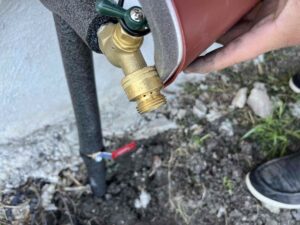Table of Contents
- Plumbing Risks in a Freeze
- How to Prepare Your Plumbing for Freeze
- Frozen Pipes and Freezing Temperatures – now what?

After the winter freeze of 2021 and 2023, Texans are looking ahead to better prepare their homes in cases of extreme weather. At Reliant Plumbing, we are ready for the winter weather and the plumbing emergencies our Austin and San Antonio communities may face. We also want to help you prepare your home for the cold and supply you with the knowledge and tools to feel more confident.

Plumbing Risks in a Freeze
Frozen pipes
- When your pipes freeze, it can cause your fixtures to run only cold water, or no water at all.
Busted pipes
- Frozen pipes can cause stress on the pipe material causing them to burst. A burst pipe will cause flooding in your home and could result in massive damages.
Frozen water heater
- In extreme conditions, your water heater can freeze, or even burst. These situations can result in cold water, flooding, or other plumbing issues.
Tips to Prepare Your Home
Be sure that your RPZ is insulated.
- The RPZ feeds to the irrigation line, causing it to have the highest number of failures during the 2021 freeze.
Cover all outdoor spigots with hose bib covers.
- This provides an added layer of protection to your water lines where they meet the cold. Master Plumber Jason Oliphant spoke to KVUE News about ways to protect your home during freezing temperatures.
Insulate water lines that go to the water heater.
- A layer of insulation can make the difference for a water heater that could be exposed to the extreme cold.
Check water pressure at home.
- Be sure your water pressure is at a normal level for your area and record your results. If you start losing pressure during the freeze, this could be a sign of a leak or other plumbing issue. Watch this video on how to check your water pressure at home.
Locate and flag your homeowner’s water shutoff outside.
- The homeowner’s water shutoff valve is usually located outside of the home. In case of emergency, you may need to shut off your water to stop flooding or other issues before your plumber arrives. You may need a water key to turn the water off.
Protect your home BEFORE winter comes and Try Our Winter Ready Special
- Locate & Flag homeowner shut-off valve
- Inspect & Insulate the water heater
- Provide & Install 2 hose bib covers
- Inspect & Insulate RPZ
- Check the water pressure
- Tech will provide information on how to shut off the valve and other winter-ready needs*
All winter precautions will be taken to help minimize damage**
*Price subject to change depending on number of fixtures, bathrooms and ease of access. Residential ONLY. Not available for commercial properties. Reliant Plumbing is not liable for any landscaping damage or any cosmetic repairs. Reliant Plumbing is not liable for any damages that are caused by winter weather or other Acts of God.
**This is not a guarantee that it will prevent any damage. Exercise caution and drip faucets when weather dips below freezing at 32 degrees Fahrenheit.
Frozen Pipes and Freezing Temperatures – now what?
Now the freeze is here and you want to keep your water running smoothly, what can you do? Below are a few ways you can provide warmth and circulation to your homes’ water system.
- Keep your house warm (even if you are not home) to at least 65 degrees.
- Open the cabinet doors under your sink to expose warm air to your pipes and supply lines.
- Turn on faucets to a slow drip.
Water Heater Tips in a Freeze
- If the pipes to an outdoor water heater are frozen, will leaving the gas on cause the water heater to explode or catch fire? No! It will not explode because the water heater has a safety valve. And it is an on demand heater, it has a pilot light, so it will not be drawing gas unless hot water is actively being pulled into the system.
- Water Heaters, such as Navien water heaters, have a freeze protection function that requires electricity. If your power goes out, and if possible, connect your water heater to an alternate electricity source to keep the freeze protection function operating.
- In the event of extended power outages, it is recommended to drain the water heater. Freezing may occur if there is a loss of power or an interruption in the gas supply to the water heater.
- If your water heater will not be used for an extended period of time, close the cold water supply and gas valves, then drain the water heater.
- Do not close the gas valve, except for routine maintenance, service, or extended power outages.
- REMEMBER: Do not attempt to operate the unit if drained or potentially frozen.
My Pipes are Actually Frozen – What Now?
Unfortunately, when pipes have already been damaged, there is not much that even the most experienced plumbers can do until they thaw. If you suspect cold pipes within poorly insulated walls, you could attempt to minimize damage by directing space heaters at walls.
- Leave the water on so they will know when they are thawed.
- Open up cabinetry and let warm air access as much of the piping as possible.
- Aiming small heaters at the walls will also help.
Water pipes will not “explode.” They may expand due to the frozen water inside of the pipe, causing damages or leaks when all thaws out.
Extreme weather can be unpredictable and unforgiving to our communities, but rest assured this plumbing team is here for you. Don’t go without hot water this winter, call us to help you prepare for this winter. We offer multiple ways to fix broken pipes including advanced non-invasive leak detection and trenchless pipe repair.
Thawing Frozen Pipes:
Thawing frozen pipes requires careful steps to avoid potential damage. Here’s a summary of the recommended process:
- Identify Frozen Pipe: If you turn on a faucet and only a trickle comes out, it may indicate a frozen pipe. Be cautious, as a burst pipe can lead to flooding. If you suspect a burst pipe, turn off the water at the main shutoff valve.
- Turn on Faucet: Turn on the faucet connected to the frozen pipe. Running water through the pipe, even if it’s just a trickle, helps melt the ice plug.
- Apply Heat: Apply heat to the frozen section of the pipe using one of the following methods:
- Electric heating pad wrapped around the pipe
- Electric hair dryer
- Portable space heater (away from flammable materials)
- Wrapping pipes with towels soaked in hot water
Avoid using open flames like blowtorches, kerosene or propane heaters, or charcoal stoves, as they can damage pipes or start a fire.
- Thaw Until Full Water Pressure is Restored: Continue applying heat until full water pressure is restored. Check other faucets in your home to ensure there are no additional frozen pipes. If one pipe freezes, others may also be affected.
- Call a Plumber if Necessary: If you’re unable to locate the frozen area, if it’s not accessible, or if you’re unable to thaw the pipe, it’s advisable to call a licensed plumber.
Remember to exercise caution throughout the process, especially if you suspect a burst pipe. If in doubt or if the situation seems more serious, it’s best to seek professional plumbing assistance.

